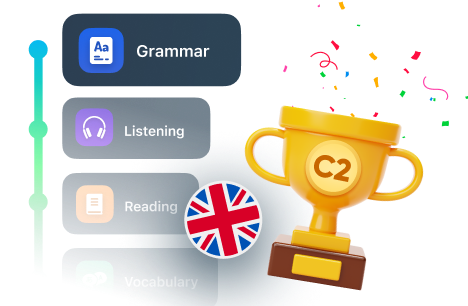Learn English with Personalized Path and AI-powered practice sessions
 Start for free
Start for free
Mastering professional English, like any language, demands dedication and unwavering effort.
There is only one truth—there is no magic potion, and there is no answer to the question of how much I can learn the German language.
In this article, we delve into the origins of Yiddish, explore its current status, and uncover the efforts made to preserve and revitalize this beloved language.
Explore a selection of the most useful English proverbs and their meanings and provide examples to illustrate their relevance in everyday life.
Fortunately, mastering some of the vocabulary and grammar of Italian may not be too challenging for English speakers.
Learning French is not challenging, especially for those who are proficient in English.
Here are ten sweet phrases, verbs, and nouns for Valentine’s Day to help you express your love in English.
We use it to describe previous actions that continued, as opposed to the simple past tense.







